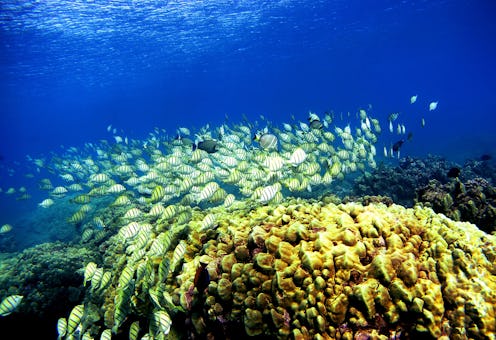News
Australian Coral Has A Life-Saving Superpower
A protein found in a certain, feathery type of coral could be the key to preventing HIV infection, researchers have found. The protein, called a cnidarin, could block the virus from infecting immune cells, and would be especially useful in sexual lubricants or gels that could be used without a condom. That's important because unfortunately, as the researchers note in a news release, women need these anti-HIV preventatives, called microbicides, to block infection without relying on a man's willingness to use a condom.
Somewhere in the bowels of the National Cancer Institute building, there's a repository — we're thinking rickety shelves full of vials, like the Hall of Prophecy in Harry Potter — full of weird natural extracts. Researchers stumbled on the feathery coral protein after looking through thousands of these things. Barry O'Keefe, one of the scientists, said that the proteins block HIV in a way they've never seen before, according to the official press release.
It's always thrilling when you find a brand-new protein that nobody else has ever seen before. And the fact that this protein appears to block HIV infection — and to do it in a completely new way — makes this truly exciting.
The proteins work by preventing the first step in HIV infection, and researchers found that they worked even in tiny amounts. They were able to block HIV at concentrations as small as a billionth of a gram, preventing the virus from getting into immune cells, called T-cells. Another researcher, Koreen Ramessar, explained how it works in the release.
We found that cnidarins bind to the virus and prevent it from fusing with the T-cell membrane. This is completely different from what we've seen with other proteins, so we think the cnidarin proteins have a unique mechanism of action.
That's always exciting in science, because who knows what else the crazy coral proteins might be good for? All the scientists have to figure out now is how to make more of it. This is all great until you remember that humanity has already kind of — whoops — set off a massive and unprecedented coral reef collapse that could last thousands of years thanks to pollution, overfishing, and the acidification of the seas as a result of global warming.
At least the scientists don't plan to add to that problem, O'Keefe said.
Making more of it is a big key. You can't strip the Earth of this coral trying to harvest this protein, so our focus now is on finding ways to produce more of it so we can proceed with preclinical testing.
